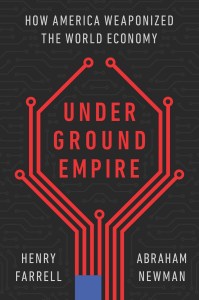There is nothing new about economic warfare; it’s as old as warfare itself. In 404 B.C., Sparta ended the Peloponnesian War by strangling Athens with a land and sea blockade. Allied blockades drove World War I Germany toward starvation, and decades later similar sanctions helped spur Adolf Hitler’s attack eastward for Lebensraum and oil. Today, Russian sanctions are above ground, openly announced. Their effectiveness is open to question, even as they are regularly strengthened. But now, like an iceberg, most of the power and almost all the mechanisms of economic coercion are below the surface, in the very infrastructure that undergirds international commerce.

Most international trade is conducted in dollars, and the movement of dollars through the SWIFT system that coordinates worldwide banking is overseen and controlled, covertly, by the U.S. Treasury Department and the Federal Reserve. The data to do this comes through undersea cables that mostly land in the United States and that are monitored by the U.S. government, as authorized by various laws, policies, and secret court rulings since 9/11. The U.S. works zealously to maintain its access to these cables and data flows, including by acting against Chinese efforts to lay competitive networks. American companies lead in the chip designs required to analyze this financial data, and even though most chips are now manufactured overseas, this advantage is protected by patent law. The Office of Foreign Asset Control in the Treasury secretly uses the data to sanction individuals, companies, and countries that fail to follow U.S. policy dictates, or associate with those already sanctioned.
The writers Henry Farrell and Abraham Newman call this the “underground empire”—the title of their new book—because it is not only hidden from view but also has no real borders. The trail of data leads ever deeper into other governments, businesses, and individual lives worldwide. The fear of these sanctions drives second-order effects, with banks preemptively avoiding associations and businesses they judge potentially at risk of being sanctioned, and governments treading warily in their trade, financial transactions, and dealings with businesses. The far-reaching effects of this system of financial control are what make American power both effective and feared.
According to Farrell and Newman, modern U.S. coercive power began in the 1970s, as international transaction clearance mechanisms were established, first by Citibank, and then by the Belgian-based SWIFT system. Around the same time, the dollar began to be the principal means of international payments, driven by American oil imports, with major banks everywhere knitted together by dollar exchange processes. Visa and Mastercard became accepted readily for retail payments, and now, trillions of dollars pass daily through the SWIFT system as money for trade and investments moves internationally.
But the reliance on the dollar in trade is only part of the story. A second component is data—data on everything, including the flow of dollars from one bank account to another, showing trade, travel, intellectual property, business plans, and all kinds of relationships. As banks built international payment systems in the 1970s, the budding tech industry built privately owned fiber optic cables, many in northern Virginia and the San Francisco area, that the U.S. government tapped into. Most of the world’s financial data flows through these private networks that land in the United States or are controlled by U.S. companies. Though private-sector economics originally drove the laying of cables, the American government now actively works against plans by China or private companies to reroute traffic or place it out of the U.S.’s reach. Collecting and analyzing all this data was primarily a responsibility for the National Security Agency, but other U.S. intelligence organizations, as well as partner organizations under the FIVE EYES program, like Britain’s GCHQ, have been increasingly involved.
A third component is that the massive data flows would be useless without the computational power to analyze them. U.S. defense industry investments drove the development of increasingly sophisticated chips, designed and manufactured in the United States, and this gave America the early lead in computational power. Today American companies still hold intellectual property protection for the design of increasingly advanced chips, even if they are manufactured abroad. A recent U.S. strategy to counter China’s rise has been to deny access to the sophisticated microchips needed for industrial and scientific development, using America’s stranglehold over the patents to those technologies. (Some observers note, however, that squeezing China on chips may backfire long term by forcing its government and businesses to grow beyond their reliance on Western technology.)
The fourth element is the laws. The terrorist strikes on September 11, 2001, strengthened the efforts of intelligence agencies to locate and track terrorists, and enlisted the U.S. Treasury in cutting the currency flows that supported terrorist operations. Secret intelligence courts became active. Obscure offices in the Commerce, State, and Treasury Departments began to assemble the data; designate certain countries, individuals, or businesses in violation; and impose sanctions. People or organizations who earned America’s economic wrath could be fined, criminally charged, and essentially cut off from banking, business, and most travel. While this is all under U.S. law, other friendly countries, such as the United Kingdom, cooperate in these actions. And this process is not limited to anti-terrorism, but is applied in enforcing a variety of American laws, including anti–money laundering, anti-drugs, and broad economic sanctions against rivals such as Iran, North Korea, China, and others.
Fifth, with massive data, the supply chains of the sanctioned entities become more important, visible, and vulnerable. This enables more precise targeting of sanctions, reaching deep into the supply chain to target second-, third-, and fourth-tier suppliers of countries and individuals the U.S. wishes to punish. Essentially, this “underground empire” can eventually penetrate to the furthest reaches of the global economy.
Moreover, the United States has been determined to maintain its advantage in global finance, especially against China. Hence America’s recent move to starve China of access to microchips. And long before that, there has been a decades-long effort to block Chinese penetration of the telephone equipment market, principally against Huawei, both in sales abroad and in preventing access to the chips needed to keep up with Western telecom capabilities. Cryptocurrencies, designed to be beyond government reach, are also a threat, and the U.S. government has actively worked to curtail them.
The authors illustrate the power of this underground empire with numerous examples. In 2019, an oil tanker from India circled aimlessly while its captain fielded entreaties from the U.S. government, which had found his name and coordinates and was offering a multimillion-dollar bribe to stop a shipment of sanctioned Iranian oil. When the captain didn’t immediately respond, threats of personal sanctions followed. In another instance, U.S. officials, worried about Chinese competition with the United States in global communications, pressured a Hong Kong bank to search transactions involving Huawei. The American officials discovered a transaction in which the daughter of Huawei’s founder had provided misleading information, and then had her detained in Vancouver for three years on charges of bank fraud.
With massive data, supply chains become more visible and vulnerable. Sanctions reach deep into the supply chain to target second-, third-, and fourth-tier suppliers of countries and individuals the U.S. wishes to punish. Essentially, this “underground empire” can penetrate to the furthest reaches of the global economy.
There are other American capabilities, not explicitly addressed by Farrell and Abraham, that further strengthen this underground empire. Here are a few of these: tracking mobile phones in real time; searching and correlating telephone metadata; and breaking into blockchain to identify terrorists and recapture stolen funds. Add to that the leading role of the Federal Reserve in setting interest rates and coordinating central bank policies globally, and all of this gives the U.S. government incredible and little understood power over individual overseas transactions, economies, and international financial institutions.
Let’s be clear: While this isn’t “kinetic,” in the sense of bombs and bullets, it is definitely a form of hard power, from which there is, eventually, little escape and almost no appeal.
Farrell and Newman warn that all of this has worrying implications. When the United States imposed renewed sanctions on Iran in 2018, our European allies sought—but ultimately discarded—means to bypass U.S. sanctions. Google has encrypted all its data, and encouraged others to do so, but with proper authorization, presumably, such data is accessible to the U.S. government. Many nations have refused to implement sanctions against Russia and Russian individuals, and there are growing efforts by Russia, China, and other nations to bypass or evade sanctions and at the same time “de-dollarize” the world economy. Farrell and Abraham worry that this might be too much power for any one nation; perhaps it could be internationalized in whole or in part. And what if other nations, like China, develop their own capabilities to track and sanction individuals and entities worldwide, as they are attempting now? The authors liken these capabilities to a revolutionary advance, like the advent of nuclear weapons, and fret that the U.S. seems to lack an understanding of their significance, a strategy for their use, or a single office responsible. Heavy considerations.
From the national security perspective, the United States is fortunate to have acquired these capabilities, even if partly by chance. They have proved effective in keeping us safe, and we need them. The men and women who wield them are by and large dedicated civil servants working to advance the best interests of the United States. They are intended to be the financial equivalent of a “precision strike,” but unlike Hellfire missiles, they don’t blast holes in the ground or kill innocent women and children.
Still, sanctions imposed are sometimes like a “fire and forget missile,” not often reevaluated or easily lifted. The sharpening of this weaponry has a momentum all its own, and it is difficult to look beyond the sanctions to respond to other, geostrategic considerations in places like Zimbabwe, where sanctions have essentially isolated the country from the West and opened it to exploitation by China and Russia.
Underground Empire should rightly stimulate much discussion, as well as wider and deeper research. We should be seeing the bigger picture that Abraham and Farrell paint and working to structure a global environment that is safe and secure for all. It could well be that this American power, if used wisely, is ultimately unchallengeable, and could provide a century of international stability. But, like nuclear weaponry, it might also be highly destructive. This genie is already out of the bottle.



